LAWN PHIX PRO PICK
The most effective weed killer I’ve found is EndRun with Trimec by Helena. This is my favorite selective broadleaf herbicide when treating cool-season lawns. It provides full control over pesky weeds in the spring and late fall (whether I’m blanket spraying in my Turfco or spot spraying with my Flowzone backpack sprayer). It also contains a co-formulated adjuvant so there’s no need to add any additional stickers or surfactants. Needless to say, EndRun is one of the top products in my personal and professional lawn care plans.
After putting in the work to get a dark green lawn, the last thing you want is a serious weed problem. These pesky plants stick out like a sore thumb and steal sun, water, and nutrients from your growing lawn.
Weeds will continue to invade and overtake your turf unless you manage to eradicate them quickly. That’s why the best prevention and control against unwanted plants is to apply pre-emergent every spring and early summer, THEN use broad-spectrum weed killers.
As a lawn care enthusiast of 10+ years, my top 12 weed killer recommendations are:
- EndRun by Helena: Top overall weed killer
- Barricade: Top pre-emergent weed killer
- Speedzone Lawn Weed Killer: Top post-emergent weed killer
- Drive XLR8: Top crabgrass killer
- RoundUp QuikPro: Top non-selective weed killer
- Avenger Organics Weed Killer: Top organic weed killer
- Johnathan Green Green-Up: Top fertilizer and weed preventer (step 1)
- Scotts Turf Builder Weed & Feed: Top weed and feed (step 2)
Here’s everything you should know about all 12 weed killers, including their cost, features, pros, and cons.
Table of Contents
The Top Weed Killers For Lawns
1. EndRun by Helena: Best Overall Weed Killer
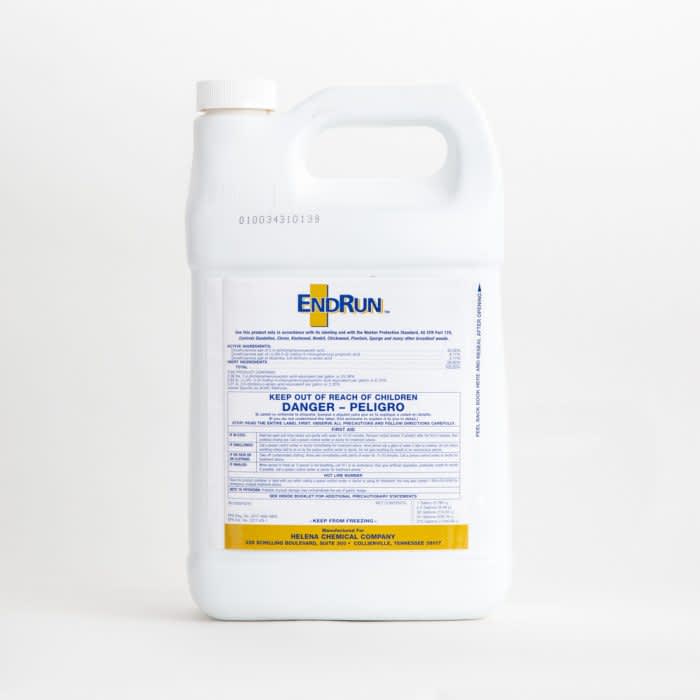
EndRud by Helena is a 3-way type selective herbicide used by professionals. It also provides excellent control of broadleaf weeds.
EndRun has its own built-in surfactant, so no need to buy and mix any separate nonionic surfactants, methylated seed oils, or adjuvants. It provides equally good results to products containing 2,4-D, Dicamba, and MCPP, but at a lower cost and with less active ingredients.
Lawn Phix Review
I use EndRun both personally and professionally as my go-to weed killer. The 3-way mixes well with quinclorac to knock out both broadleaf and grassy weeds. I’ll broadcast/blanket spray in the early spring to get ahead of any weeds, then spot-spray throughout the growing season.
Below are pictures of what the chemical looks like. I’ll update the image with a new jug when I order another case next season. As you can see, the chemical is dark, and the gallon jug was well-used.
PROS
What we liked.
- Covers over 80 weeds
- Has built-in surfactant
- Less than $1.00 per application
CONS
What we didn’t like.
- Only available in 128 oz. jugs
Check the latest price on End Run at Do My Own, Amazon, and DIY Pest
EndRun Application Rates
Mix 1.1 – 1.5 fluid oz. per 0.5 – 5 gallons of water per 1,000 sq. ft. and spot spray weeds with the solution in a hand pump or backpack sprayer, or broadcast sprayer. At high rates, this gallon will yield approximately 2 total acres.
EndRun Specifications
- Active ingredient: 2,4-D, Dicamba, MCPP-P
- Application: Sprayer
- Coverage: Up to 116,000 sq. ft.
- Product size: 128 oz.
- Rates: 1.1 – 1.5 oz.
- Type: Liquid, systemic
- Use in: Ornamental Lawns and Turf in institutional, ornamental, and residential sites
- Weeds targeted: Carpetweed, Chickweed, Clover, Dandelion, Ground Ivy, Henbit, Horsenettle, Oxalis, Plantain, Poison Ivy, Ragweed, Spurge, Thistle, Wild Onion and more
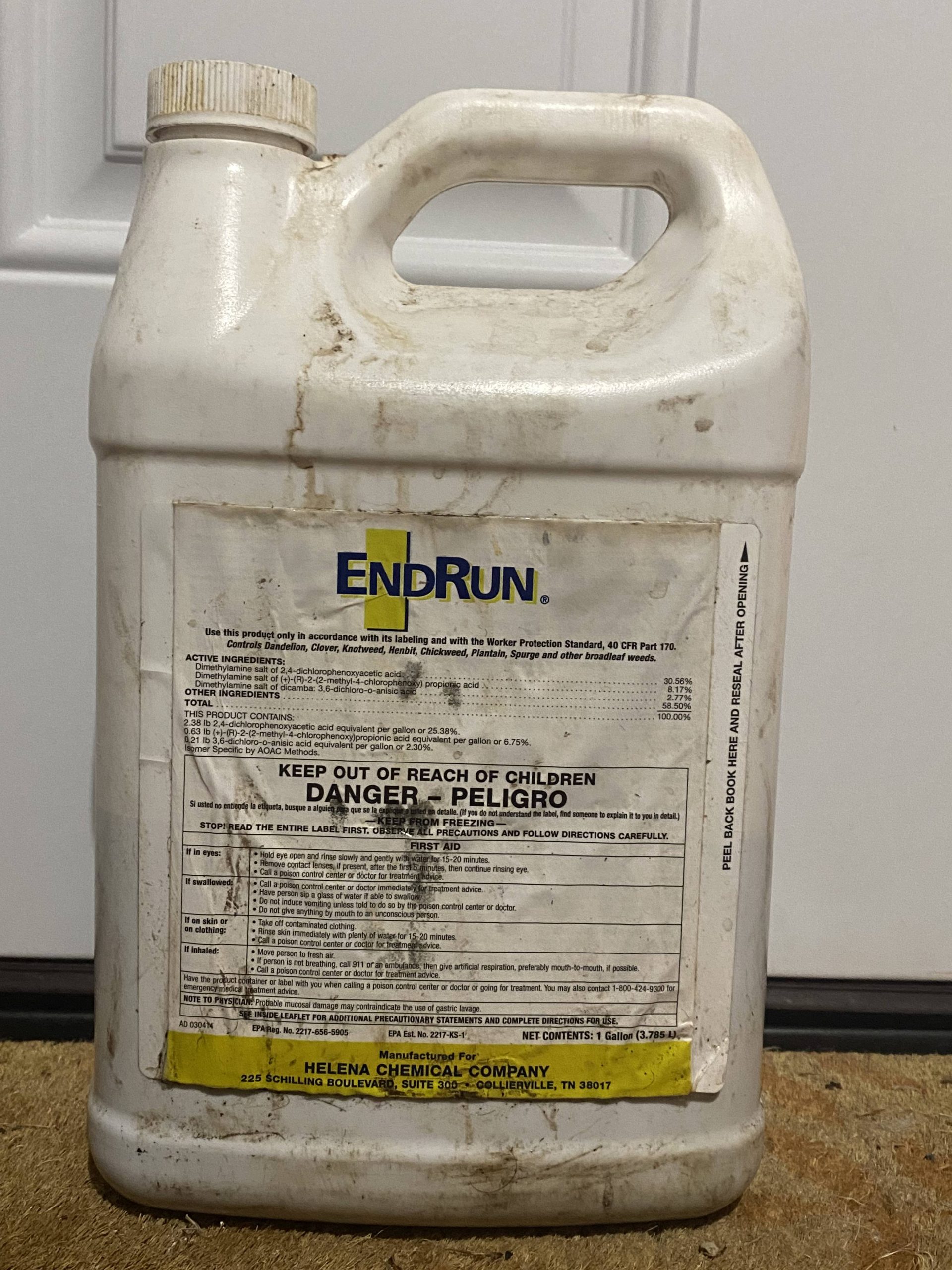
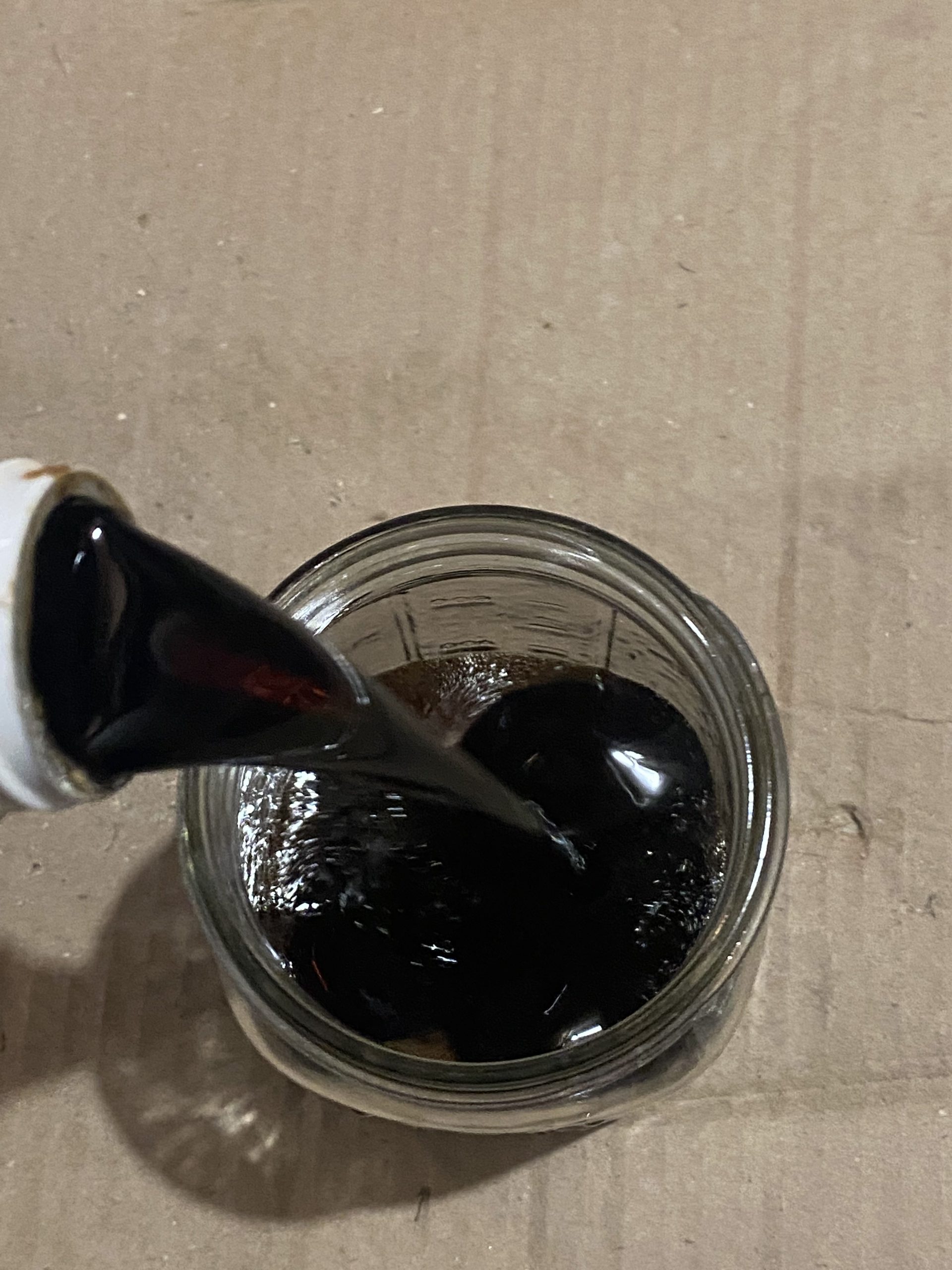
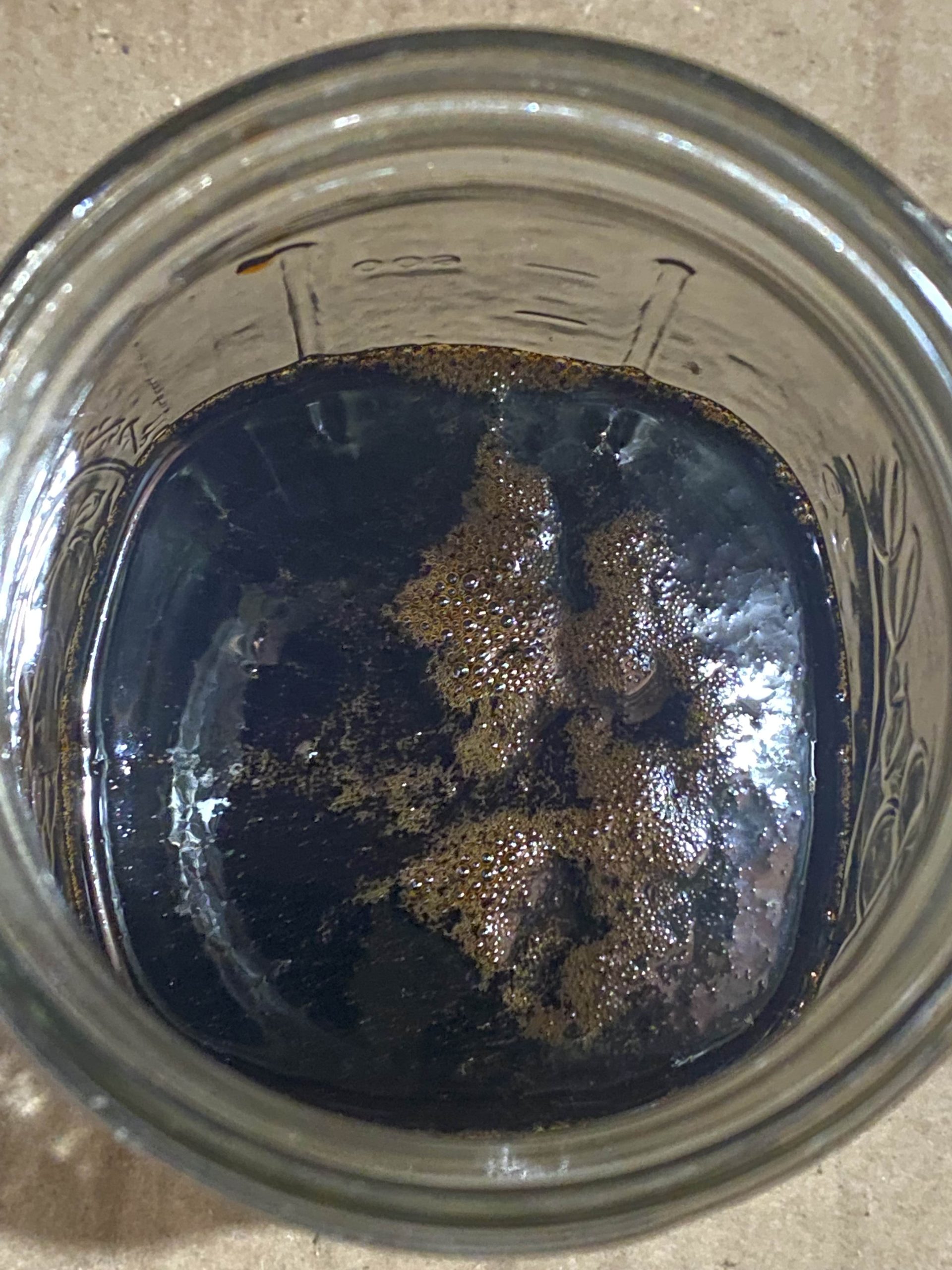
2. Barricade: Best pre-emergent weed killer
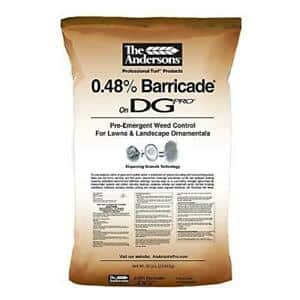
Barricade contains the active ingredient Prodiamine and can be found in granular and liquid applications. Barricade is a pre-emergent herbicide and prevents weeds without harming beneficial and wanted plants. This is ideal when applied before weeds seeds can germinate and before weeds emerge. Barricade is one of the top pre-emergent weed killers and can be used on landscaping, ornamentals, turf, and sod farms, to name a few. It must be activated with water in 14 days or it could lose efficacy.
Lawn Phix Review
I use Prodiamine every April with great results and recommend it as part of my free lawn care guide. Many professional lawn care operators use Dimension for Rounds 1-2, but Prodiamine just works better. Yes, it’s yellow and it can look messy – but it just works so much better. I use this in the spring in Round 1, and again in the last summer if my customers do not overseed. This is a great fall pre-emergent option to help suppress winter weeds and poa annua.
PROS
What we liked.
- Lasts as long as 9 months
- Affordable and comes in generic versions
- Great weed killer of all types
- Early season application is best
CONS
What we didn’t like.
- Must be watered right away
- Not the best for broadleaf weeds
- Breaks down with sunlight exposure
Check the latest price on Barricade at Do My Own, Amazon, and DIY Pest.
Barricade Application Rates
You need roughly 1.5 to 4 pounds of Barricade Granular Pre-Emergence Herbicide per 1,000 square feet of turf. This is higher for ornamental plants (between 2.5 and 5.94 pounds per 1,000 square feet of turf).
Barricade Specifications
- Active ingredient: Prodiamine
- Application: Spreader
- Coverage: Up to 25,000 sq. ft.
- Product size: 50 lbs.
- Rates: 2.0 – 3.6 lbs. per 1,00- sq. ft.
- Type: Granular
- Use in: Ornamental lawns and turf in institutional, ornamental, and residential sites
- Weeds targeted: annual bluegrass, chickweed, crabgrass, foxtails, purslane, spurge, woodsorrel, and more.
3. Speedzone Lawn Weed Killer: Best selective weed killer
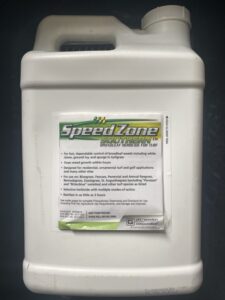
SpeedZone by GBI Gordon combines 4 active ingredients (2,4-D, 2-ethylhexyl ester, Dicamba, Mecoprop-P). It gets into the leaf tissue and roots to provide great results and fast visible burndown. In some states, it is restricted to only those with restricted applicator licenses. TZone, End Run, and Trimec are excellent alternatives for those states.
SpeedZone is one of the most popular selective herbicides for controlling and killing broadleaf weeds. No matter your target pest, SpeedZone is surely to cover as it’s labeled for control of over 100 weeds. The SpeedZone technology, when applied according to the label, is taken up through leaf tissue and roots for amazingly-quick results. Visible signs of effect can be seen as early as 24 hours post-application and make a great option for use on cool-season turf.
Note that the original SpeedZone is in high demand and often out of stock. It also may not be available to purchase online in your state without an application license (like my home state of Massachusetts). If this is the case, PBI Gordon has variations of the original Spredzone that will work as effectively.
Lawn Phix Review
Speedzone is one of my favorite weed killers for broadleaf weeds. It’s a toss-up between Speedzone and End Run with Trimec, but for DIYers looking to keep the initial up-front costs lower, Speedzone is a terrific choice. Plus it comes in a smaller 20 oz. bottle which makes it less cumbersome to pour and smaller to store versus 1-2.5 gallon jugs.
This is terrific for homeowners looking for professional-grade herbicides. I began using this for two consecutive years in my own lawn starting in 2018. For homeowners it’s convenient because it does not require a surfactant, the bottle size is perfect, and the initial price tag isn’t as high as the larger volume solutions. Since I have a large scale operation, I need to buy in bulk so their other SpeedZone options – like EW Southern – come in 2.5 gallon jugs. This caters to me and other lawn care operators who service acres of properties.
I also like Speedzone and Tenacity Herbicide to effectively kill all types of grassy and broadleaf weeds.
PROS
What we liked.
- Small, convenient 20 oz. bottle for smaller lawns
- A 4-way herbicide that provides quick results
- Controls over 100 weeds
CONS
What we didn’t like.
- Not available (or restrictions) in many states
- Higher per-app costs (approximately $2.63 per app)
Speedzone Lawn Weed Killer Application Rates
For cool-season grasses, mix 1.1 to 1.8 fluid ounces with one gallon of water for every 1,000 square feet. For warm-season grasses, drop the fluid ounces to 0.75 to 1.5 ounces.
Speedzone Lawn Weed Killer Specifications
- Active ingredient: 2,4-D,Mecoprop-p, Dicamba, Carfertrazone-ethyl
- Application: Sprayer
- Coverage: Up to 4 acres
- Product size: 1 gallon
- Rates:
- Cool season: 1.1 – 1.8 oz. per 1,000 sq. ft.
- Warm season: 0.75 – 1.5 oz. per 1,000 sq. ft.
- Type: Liquid
- Use in: Ornamental lawns and turf in institutional, ornamental, and residential sites
- Weeds targeted: Purslane, dandelion, chickweed, henbit, creeping charlie, and more
4. Drive XLR8: Best crabgrass killer
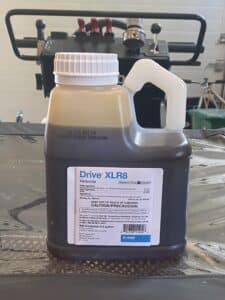
No surprise here. I’ve written about Drive XLR8 several times here on Lawn Phix and it’s the only crabgrass killer I keep in my professional chemical rotation. The active ingredient is Quinclorac, which is most effective for killing crabgrass, but also targets some broadleaf weeds and grassy weeds.
This is best when used on the specific weed you want to spray. Some grasses, such as St. Augustine grass can not handle quinclorac as a selective weed killer.
Lawn Phix Review
I have Drive XLR8 on hand at all times for crabgrass. I’ll mix this with Empero and a non-ionic surfactant (Induce) to hit crabgrass and nutsedge – or with On Deck (2,4-d and dicamba), which makes an amazing 3-way herbicide that covers both grassy and broadleaf weeds in one.
PROS
What we liked.
- Labeled for up to 100 different weeds
- Works almost immediately
CONS
What we didn’t like.
- Restricted in some states
- Must be cautious where it is sprayed
Drive XLR8 Application Rates
The label recommends 0.5 gallons of water mixed with 1.45 fluid ounces of product for every 1,000 square feet. See the nitty-gritty details in the online label.
Drive XLR8 Specifications
- Active ingredient: Quinclorac
- Application: Sprayer
- Coverage: One acre
- Product size: 64 oz.
- Rates: 1.45 oz. per 1,000 sq. ft.
- Type: Liquid
- Use in: Ornamental lawns and turf in institutional, ornamental, and residential sites
- Weeds targeted: clover, crabgrass, dandelion, dollarweed, foxtail, horseweed, wild violet, and more.
5. RoundUp QuikPro: Best non-selective weed killer
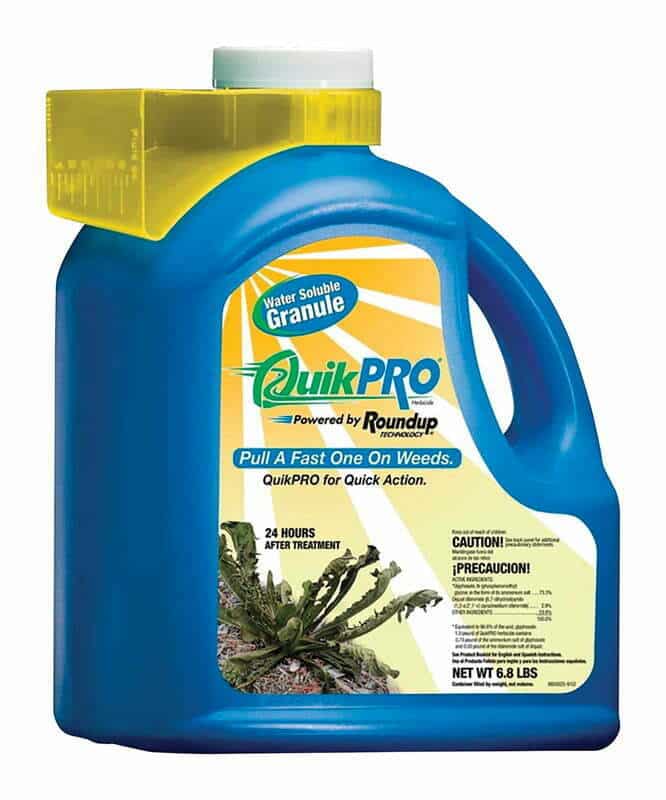
RoundUp QuickPro is a top weed killer for commercial and residential use. It has two active ingredients (Glyphosate and Diquat) to provide a more effective and efficient burndown.
Lawn Phix Review
I love that QuickPro will kill hardy weeds such as woody brush, grass weeds, and broadleaf weeds. The rain will not wash it away due to its fast dry time. It also comes premixed with Diquat, so there is no need for tank mixing.
PROS
What we liked.
- It contains a second ingredient
- It has a fast visual result
- Fast burndown and kills weeds to the root
- It is ideal when undergoing a full lawn renovation
CONS
What we didn’t like.
- It may take a longer time to see the results
- Will not work on horseweed
RoundUp QuikPro Application Rates
Mix 1.5 ounces per gallon of water for every 1,00 square feet of turf.
RoundUp QuikPro Specifications
- Active ingredient: Glyphosate, Diquat dibromide
- Application: Sprayer
- Coverage: 70 gallons (70,000 sq. ft.)
- Product size: 6.8 lbs.
- Rates: 1.2 – 1.5 oz. per gallon
- Type: WDG
- Use in: Ornamental lawns and turf in institutional, ornamental, and residential sites
- Weeds targeted: Non-selective: turfgrass, annual and perennial weeds, brush weeds, and tree seedlings
Check the latest price on QuickSilver at Do My Own and Amazon.
6. Avenger Organics Weed Killer: Best organic weed killer
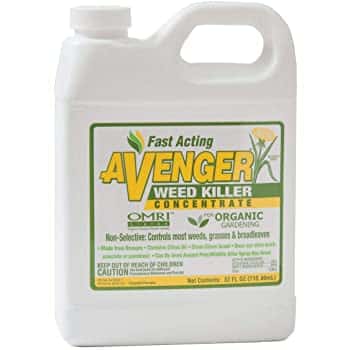
Avenger is the best organic weed killer for lawns because it is a nonselective herbicide making it safe for the environment. It is made from orange rind with D-limonene (citrus oil) as its active ingredient. Avenger Organics removes the plant cuticle to dehydrate it so it dies. This natural weed killer is fast-acting and does not stain. However, since it is a nonselective weed killer, it will damage or kill your good grass.
Lawn Phix Review
I love this stuff. The first time I used it was in 2017 when I was killing off poa annua. I also used this as part of my 2020 lawn renovation project. The front yard is a popular spot for my kids and the neighbors to hang out and play, so I felt better knowing I had a safer alternative to other non-selective chemicals. Avenger did the job, and my lawn came out great.
PROS
What we liked.
- Safe for the environment
- Contains D-limonene and is organic OMRI listed
- Comes in concentrated and ready-to-use (RTU) form
CONS
What we didn’t like.
- May not see results right away
- Strong smell
Avenger Organics Weed Killer Application Rates
Mix one quart of Avenger for every 3-7 quarts of water.
Avenger Organics Weed Killer Specifications
- Active ingredient: D-limonene
- Application: Sprayer
- Coverage: Up to 8 gallons (8,000 sq. ft.)
- Product size: 128 oz. (1 gallon)
- Rates: 1 quart per 3-7 quarts of water
- Type: Liquid
- Use in: Ornamental lawns and turf in institutional, ornamental, and residential sites
- Weeds targeted: most annual grasses, grassy and broadleaf weeds, and some turfgrass
Compare Avenger weed killer prices on Amazon and Do My Own.
7. Jonathan Green Veri-Green: Best fertilizer and weed preventer (step 1)
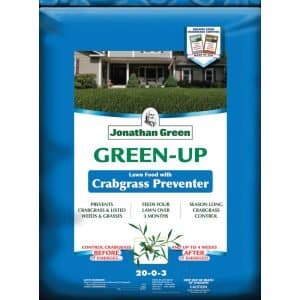
Veri-Green Crabgrass Preventer plus Lawn Fertilizer is the first step in a four-step lawn care program for a weed-free lawn. It is clear, odorless, and will not stain your hands or shoes. It contains fewer harmful ingredients than other options. It can be used all season long to prevent crabgrass effectively. It can feed lawns for as long as three months.
Lawn Phix Review
I’m a big fan of Jonathan Green products, and the Green-Up is the perfect pre-emergent + fertilizer combo for Round 1 in early spring. Remember that you will still need to apply a second split pre-emergent application for season-long control. You can also use this and Magical Plus or Love Your Soil together.
CONS
What we didn’t like.
- Only works up to the three-leaf stage of weed growth
Veri-Green Crabgrass Preventer plus Lawn Fertilizer Application Rates
Apply 3-4 lbs. per 1,000 sq. ft.
Veri-Green Crabgrass Preventer plus Lawn Fertilizer Specifications
- Active ingredient: Dithiopyr
- Application: Spreader
- Coverage: 15,000 sq. ft.
- Product size: 48 lbs.
- Rates: 3-4 lbs. per 1,000 sq. ft.
- Type: Granular
- Use in: Ornamental lawns and turf in institutional, ornamental, and residential sites
- Weeds targeted: Annual Bluegrass, bittercress, carpetweed, crabgrass, dallisgrass, goosegrass, foxtail, henbit, woodsorrel, and more
8. Scotts Turf Builder Weed & Feed: Best weed and feed (step 2)
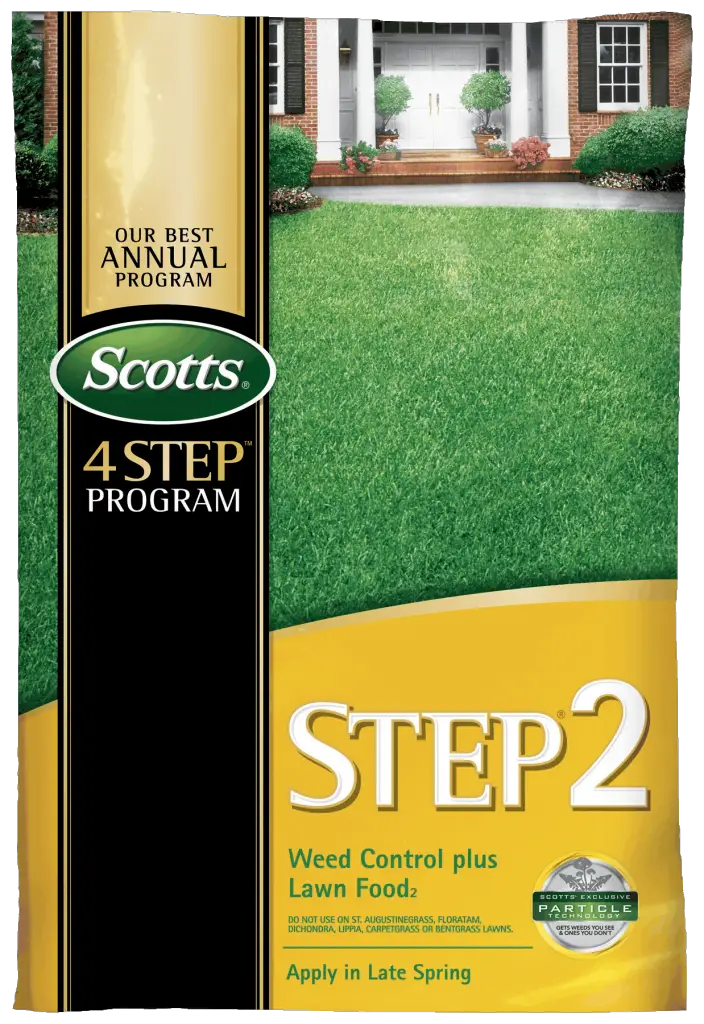
Scotts Turf Builder Weed & Feed is the second step of a four-step lawn weed killer program. It attacks not only weeds you can see but also ones you do not. This product should be applied in late spring for ideal results. This weed killer is ideal for dandelions, clover, and broadleaf weeds. It feeds lawns to thicken them and crowd out weeds.
Lawn Phix Review
I am not a fan of weed and feed products. I’m not even a big proponent of Scott’s products, but Round 2 works great when applied according to the directions. This Step 2 and their Turf Builder for seeding are the only two products from this brand that I like and can honestly recommend. It effectively kills broadleaf weeds and is the best option for those sticking to a simple 4-step plan.
CONS
What we didn’t like.
- Cannot be used on certain types of grass
- Grass must be wet before applying
Scotts Turf Builder Weed & Feed Application Rates
Apply 3-4 lbs. per 1,000 sq. ft.
Scotts Turf Builder Weed & Feed Specifications
- Active ingredient: 2,4-D,Mecoprop-p
- Application: Spreader
- Coverage: 15,000 sq. ft.
- Product size: 42.87 lbs.
- Rates: 3.5 lbs. per 1,000 sq. ft.
- Type: Granular
- Use in: Ornamental lawns and turf in institutional, ornamental, and residential sites
- Weeds targeted: Dandelion and other broadleaf weeds
Weed Killers on Amazon
Weed Killer FAQs
What’s the difference between grassy weeds and broadleaf weeds?
As the name suggests, broadleaf weeds have broad, distinct leaves. There will be a single main vein running up the center of the leaf, with many smaller veins spreading off of it. Some broadleaf weeds may also have colorful flowers sprouting from the top which can help identify the weed.
When is the best time to apply weed killer to my lawn?
Generally in the spring through the early summer to catch newly germinated annual weeds, and early emergence of biennials and perennials. Also in the fall as the weeds begin to store energy and go dormant for the winter. Also, as a good practice, do not apply weed killers when outside temperatures are over 80 degrees. This may potentially harm your good turf.
What kills weeds permanently?
Depending on the type of weed and stage of development will dictate the weed killer. To be completely sure, use glyphosate or a non selective weed killer. However please note that these will also kill anything it comes in contact with like plants and your good grass. For selective herbicides, choose weed killers that contain 2,4-D, 2,4-D, MCPP-P, and Dicamba, dimethylamine salt and/or Carfentrazone.
This list only include selective weed killers. Wear personal protective equipment (PPE). Be careful and avoid contact to eyes and skin. Most products are safe for kids and pets to re-enter once the surface has dried. Always read the labels and search the instructions for proper application rates.
For major infestations of weeds in large area, a non-selective herbicide such as glyphosate may be needed. If you’re looking for a natural weed killer for lawns, there are homemade vinegar weed killer recipes. However the best organic weed killer we have used is Avenger, but like glyphosate, it will also kill grass. We’ve seen the weeds begin to discolor within 15 minutes after application at a 3:1 ratio.
Lastly, if you are in a pinch, you can run straight to your local garden store or big box store for ready to use (RTU) weed killer sprays such as Ortho Weed B Gone.

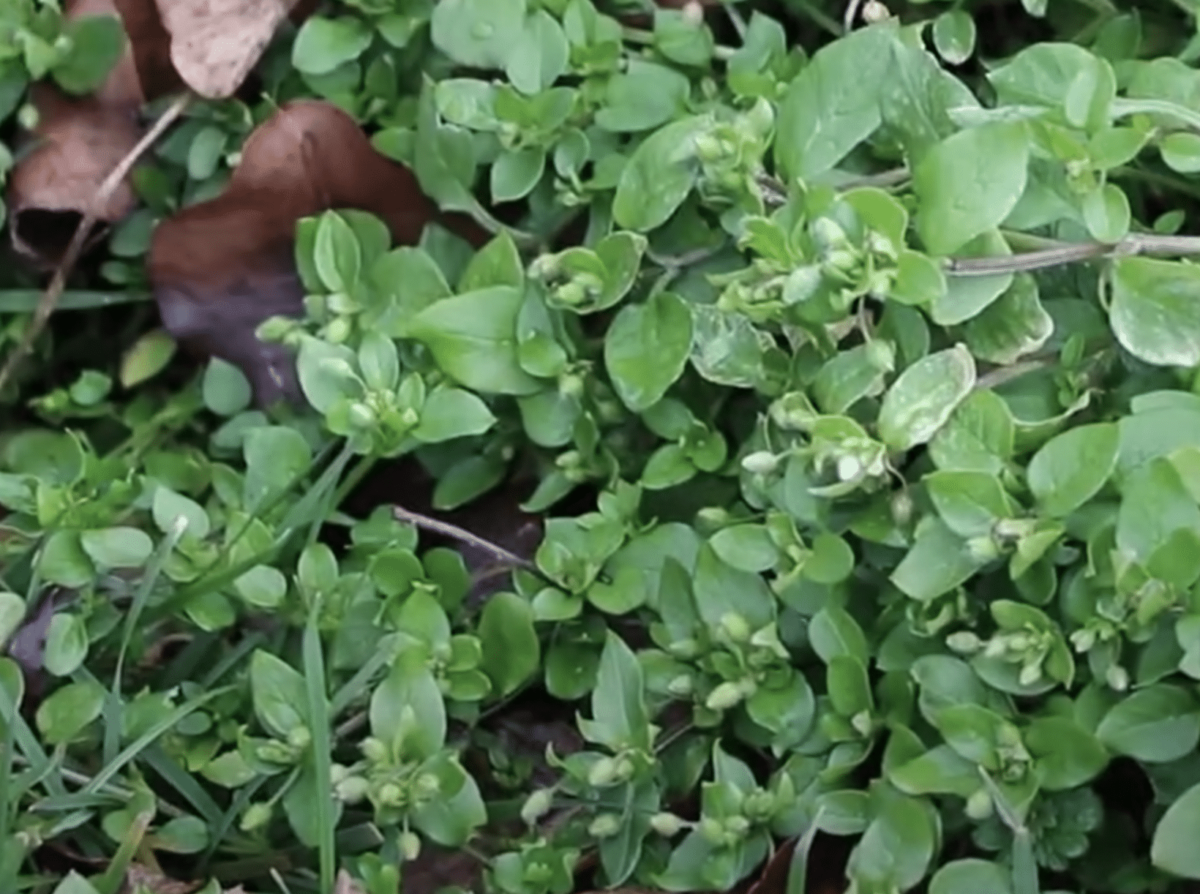
trying to kill wild violets
Hi Roger. I’d go with a 2- or 3-way herbicide like End Run but I’d also add some Triclopyr with it.